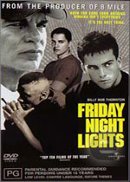
Friday Night Lights
There’s a certain amount of respect I think needs to be bestowed upon films that rely on tired old clichés and yet can still play it straight and make you forget you’ve already seen these characters hundreds of times, slugging it out with the same old battles you know they’ll overcome by credits time. And clichés don’t come any more familiar than in the American small town high-school football film. You may be familiar with the tale of a boy trapped in the small town whose only way out is a scholarship. Or the son that has to live in his former football playing father’s shadow. Maybe the drunk dad whose anger towards his son reflects his own failure? No? Well what about the cocky talented star player that injures himself and ends his career. Ahh, I thought so.
With these boxes all checked it stands out oddly that Billy Bob Thornton’s coach isn’t an angry tyrant that punishes his team because he never made the big time himself, neither is he a philosophical mentor that shapes his team not only as players, but also, as people, with some bullshit football-is-life-life-is-football analogy. No, his coach is just a normal coach that yells when his team does wrong and pats them on the bum when they do right. Refreshing, certainly, but around such other walking clichés, the role isn’t a very interesting one and makes you wonder why the film needed to focus on him at all.
Friday Night Lights is just Varsity Blues without the teen sex comedy angle, which in turn was just a dozen other American small-town high-school football films all so clichéd I can’t even pick one from the pack. Based on a true story (a journalist apparently spent a year following the players and the team and wrote a book about their season) the film starts as a poem to small town football, with some pretty shots of rundown store fronts with 'Gone to game' signs dangling in the window, but it never quite delves into the important question of why football is so important to this community. Instead there’s just a recurring scene where prominent townspeople all but threaten the coach if he doesn’t bring home the championship in a way that kind of makes them all seem like pod people.
The captions before each football game remind us that this is a real story set in the 80s, but there is not a thing that visually or aurally ties the film in that era. Not even a single Bon Jovi track, much to my dismay. I’m not saying the footballers should have been walking around with Wham! t-shirts or Flock of Seagulls hairstyles, but there could have been many subtle touches that reflected the period perfectly. See Donnie Darko for an example of this.
The football scenes made me feel like I did when I was watching Black Hawk Down, where once the soldiers had their helmets on I had no idea who was who. (I swear Ewan McGregor died several times in that film). Of course I have no idea of any intricacies of the game anyways, but at least it would have been a pay off if I could have noticed when the kid who couldn’t catch a pass to save himself all movie finally did catch the ball to win them a game. I assume that happened, but can’t be sure. With a token rock score pumping behind the hard hits and bone-crunching tackles, there’s certainly a wince factor in watching some of the game action, but after a few games it starts to drone a bit as their season goes by.
It may seem like a cliché reversal that the team loses their big game at the end, and it might have actually been a surprise if it wasn’t flagged by the nonsensical “winning and losing are just the same thing” speeches peppered throughout the film by the coach. Amusingly enough, the film then seems to take aim and blame the referees for losing them the game, which kind of defeats the purpose of what I thought this film was about.
Instead of being about a team that just wasn’t good enough, which is much more real and interesting, it seems it was really was about a team that was the best and would have been the champs – if it wasn’t for those dastardly refs.
I didn’t get to see the 'where are they now' epilogue at the end because the DVD stuffed up, but I’m pretty sure I can piece together who went on to play college football and who never played football again but had a successful career with something else blah blah blah, etc, etc, because I’ve seen it all before.
Friday Night Lights had all the elements that would have made a great documentary, and I’m sure the book is a great read. As a feature film however it just feels like more of the same, regardless of how true these clichés may have been.